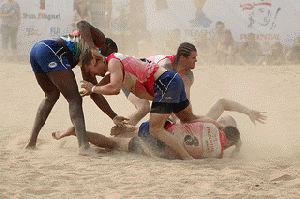************** *************** **************
Step Two: The Circumstances from the Human Breakthrough Make the Struggle for Power Inevitable
[Step one is here, on how the breakthrough made by humankind --about 10,000 years ago-- created a situation unprecedented in the history of life: a living entity not regulated by any overarching order. I say that the terrible turn made by social evolution --toward tyranny and war and brutality-- is to be explained in terms of that unprecedented circumstances. Here I provide the next step in explaining how a force emerged that has driven the evolution of civilization in directions that people did not and would not choose.
All the previous entries in this series --"Swinging for the Fences"--are listed at the end here.]
The Struggle for Power
In his classic, Leviathan, Thomas Hobbes (1960) describes what he calls "the state of nature' as an anarchic situation in which all are compelled, for their very survival, to engage in a ceaseless struggle for power. About this "war of all against all,' two important points should be made: that Hobbes's vision of the dangers of anarchy captured an important dimension of the human condition, and that to call that condition "the state of nature' is a remarkable misnomer.
In nature, all pursue survival for themselves and their kind. But they can do so only within biologically evolved limits. The living order of nature, though it has no ruler, is not in the least anarchic. Each pursues a kind of self-interest, each is a law unto itself, but the separate interests and laws have been formed over aeons of selection to form part of a tightly ordered harmonious system. Although the state of nature involves struggle, the struggle is part of an order. Each component of the living system has a defined place out of which no ambition can extricate it. Hunting-gathering societies were to a very great extent likewise contained by natural limits.
With the rise of civilization, the limits fall away. The natural self-interest and pursuit of survival remain, but they are no longer governed by any order. The new civilized forms of society, with more complex social and political structures, created the new possibility of indefinite social expansion: more and more people organized over more and more territory. All other forms of life had always found inevitable limits placed upon their growth by scarcity and consequent death. But civilized society was developing the unprecedented capacity for unlimited growth as an entity. (The limitlessness of this possibility does not emerge fully at the outset, but rather becomes progressively more realized over the course of history as people invent methods of transportation, communication, and governance which extend the range within which coherence and order can be maintained.) Out of the living order there emerged a living entity --civilized society-- with no defined place.
In a finite world, societies all seeking to escape death-dealing scarcity through expansion will inevitably come to confront each other. Civilized societies, therefore, though lacking inherent limitations to their growth, do encounter new external limits -- in the form of one another. Because human beings (like other living creatures) have "excess reproductive capacity,' meaning that human numbers tend to increase indefinitely unless a high proportion of the population dies prematurely, each civilized society faces an unpleasant choice. If an expanding society willingly stops where its growth would infringe upon neighboring societies, it allows death to catch up and overtake its population. If it goes beyond those limits, it commits aggression. With no natural order or overarching power to prevent it, some will surely choose to take what belongs to their neighbors rather than to accept the limits that are compulsory for every other form of life.
In such circumstances, a Hobbesian struggle for power among societies becomes inevitable. We see that what is freedom from the point of view of each single unit is anarchy in an ungoverned system of those units. A freedom unknown in nature is cruelly transmuted into an equally unnatural state of anarchy, with its terrors and its destructive war of all against all.
power struggle by istolethetv
As people stepped across the threshold into civilization, they inadvertently stumbled into a chaos that had never before existed. The relations among societies were uncontrolled and virtually uncontrollable. Such an ungoverned system imposes unchosen necessities: civilized people were compelled to enter a struggle for power.
The meaning of "power,' a concept central to this entire work, needs to be explored. Power may be defined as the capacity to achieve one's will against the will of another. The exercise of power thus infringes upon the exercise of choice, for to be the object of another's power is to have his choice substituted for one's own. *
* As used here, power is a coercive capacity. Power may also be defined as the ability to restrict the range of another's choices. It is thus differentiated from the kind of persuasive power that changes how others decide to exercise choice (except to the extent that, as, for example, in brainwashing, and less obviously in many other forms of indoctrination, coercive power creates the situation in which persuasion becomes possible).
Power becomes important where two actors (or more) would choose the same thing but cannot both have it; power becomes important when the obstacles to the achievement of one's will come from the will of others. Thus, as the expanding capacities of human societies created an overlap in the range of their grasp and desire, the intersocietal struggle for power arose.
(Note: You can view every article as one long page if you sign up as an Advocate Member, or higher).






